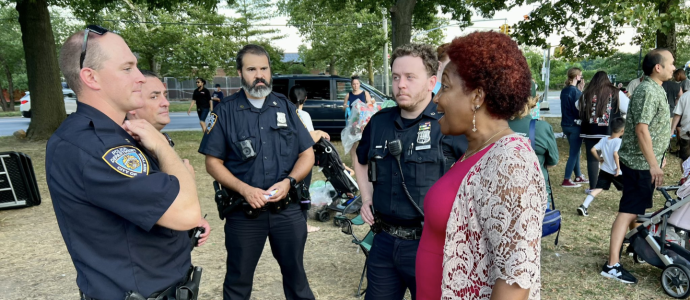People with intellectual and developmental disabilities (I/DD) have their basic human rights violated far more often than neurotypical people. When it comes to interacting with law enforcement, these violations can be a path to injury, trauma, and even death. According to a 2017 study published in the Journal of Autism and Developmental Disorders, 20% of youth with autism had been stopped and questioned by police by age 21, and almost 5% had been arrested. But if police understood how to approach and connect with people on the autism spectrum, the statistics could be far less bleak.
Advocating for the rights of people with I/DD is at the heart of much of Consuelo Senior’s work. As Assistant Director of YAI Knowledge, Senior guides organizations, companies, and governments on how to best engage with people with I/DD. Currently, Senior is working to amend a New York City Council bill to ensure that NYPD trainees receive adequate instruction on recognizing and responding to people with autism spectrum disorder (ASD).
“A lot of times people have the wrong view of those on the autism spectrum,” Senior said. “This bill is important because police are first responders. How they go into a situation can make it better or worse.”
This is not Senior’s first attempt to improve police understanding of people with I/DD. She regularly works with the Brooklyn DA as an education partner to train law enforcement officials to interact with people with disabilities, specifically with victims of sexual assault.
Senior’s version of the bill, drafted alongside Councilmember Mercedes Narcisse, updates the definition of ASD in accordance with the DSM-5, the American Psychiatric Association’s most recent compendium of diagnoses. The amendment would also require police officers to receive training on approaching and engaging with people on the autism spectrum from someone who has experience working with the population. Additionally, it would require that training materials are reviewed annually to ensure that they are up to date and relevant.
Councilmember Narcisse points out that more than 300,000 New Yorkers are on the autism spectrum, noting the amendment could help reduce the risk of injury or death during police interactions for people with ASD.
“Traditional tactics and approaches that would work for neurotypical people may not work for people with ASD,” Narcisse said. “Therefore, it is imperative that all our NYPD officers get fully trained to recognize and properly engage people with ASD to prevent further escalation.”
Senior agrees, adding that police often have the wrong first impression of people on the spectrum.
“Police sometimes think people with autism are a danger. Often times they’ll see self-soothing behavior and interpret it as a form of aggression. So, if someone starts jumping, flapping, or rocking back and forth, or their vocalizations increase, police may think, ‘this person is about to attack me, this person needs to be contained and restrained,’ and not understand that this person is in crisis and is actually saying, ‘I’m in crisis, I need help.’”
Ronald Horowitz, 71, who is on the autism spectrum and lives in a YAI residence in Brooklyn, said his experience with the police has mostly been positive but knows this isn’t the case with everyone.
“My interaction with police has been good; they help elderly people like me who can’t get around much,” said Horowitz. “They help me with directions and how to get to places, but there are bad ones that are not so good, too.”
Horowitz hopes the bill will help bridge the gap for law enforcement who interact with people on the spectrum.
“This bill is important because it will push for police to learn about who we are and our unique needs so that we can feel safe and comfortable whenever we are around them” he added.
“Just because I have a disability doesn’t make me different and I hope police try to understand people like us need more guidance,” said Horowitz. “They need to be more patient with us when explaining things and kinder. I think we all need to be more respectful with each other.”
The hearing to amend the bill is scheduled for September 30. Keep track of its progress on twitter.com/yainetwork or facebook.com/yaihope

